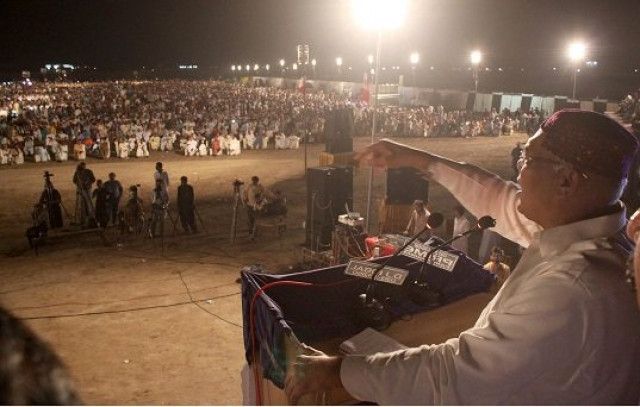'Don't replace feudal lords with feudal lords in the elections'
Sindh Taraqi Pasand party holds 27th motherland day public meeting in Hyderabad

PHOTO: ONLINE
"If nationalism lacked thought of the class struggle, then politics will remain mere slogans," he said while addressing the 27th motherland day public meeting in Hyderabad on Saturday night.
Magsi suggested that the political struggle for rights of peasants and labourers should feature in nationalist politics, which has hitherto remained focused on the rights of Sindhi people. He lamented that in the existing democratic dispensation, the feudal lords and influential persons instead of ordinary people, have become the centre of power.
"Don't look to replace feudal lords with feudal lords [in the general elections]. Let's bell the cat," he urged the people of Sindh while offering his party as a replacement to other political parties in the general elections.
He contended that until feudal lords and tribal chiefs were not defeated in the elections, democracy would remain fragile and incomplete. He argued that the question of nationalism has not been addressed in Pakistan for the last 70 years.
Pashtun sit-in — a new political awakening?
"Zulfikar Ali Bhutto [the former prime minister and founder of the Pakistan Peoples Party] gave us the Constitution of 1973, but even he could not resolve the problems faced by the nations which together formed Pakistan," he said referring to the decades old demand of the nationalists for complete autonomy of the provinces and acceptance of the provincial languages as the national languages.
The STP chairperson believed that Nawaz Sharif, the former prime minister and president of Pakistan Muslim League - Nawaz, is fighting the battle for his own political survival rather than to uphold democracy. He alleged that Nawaz did not fulfill the promises he made to political and nationalist leaders in Sindh before the 2013 general elections.
Despite the political differences he had with Nawaz, Dr Magsi said he does not approve of the manner in which Nawaz was being dealt with.
"I don't support Nawaz's alleged plunder of public money. But is Nawaz the only politician who is involved in corruption in Pakistan?" he questioned.
Sindh political, nationalist parties reject census results
"Has Asif Ali Zardari [the former president] introduced the system of the pious Islamic caliphate in Sindh? We don't accept selective accountability." He criticised Zardari for failing to protect Sindh's right on the water of the Indus River and for allegedly exploiting farmers in the province for his own monetary gain.
Dr Magsi demanded that the National Accountability Bureau (NAB) check the assets of all public servants, starting from the meter readers of the power companies to senior officials. "Until a few hundred army generals, judges, politicians and bureaucrats are not given punishments, such as the death penalty, we can't rid the system from the menace of corruption."
STP Vice-President Abdul Hameed Memon said some nationalist parties were working for the establishment, but theirs was an independent party. "From the right of Sindh over the water of Indus River to the settlement of people of other ethnic identities in Sindh, the STP has remained at the front of resistance," he said.
‘Indo-Pak partition history distorted for nationalist purposes’
The party's general secretary, Gulzar Soomro, said the nexus between corruption, the PPP, feudal lords and tribal chiefs ought to be exposed. STP leader Fatah Samejo blamed the PPP for allowing the Afghan and Bihari people to register as voters in Sindh.
Baloch national leader Abdul Haee Baloch, Qaumi Awami Tehreek's Dr Aziz Talpur, Sindh United Party's Roshan Ali Buriro and other political and nationalist leaders also spoke at the event.



















COMMENTS
Comments are moderated and generally will be posted if they are on-topic and not abusive.
For more information, please see our Comments FAQ